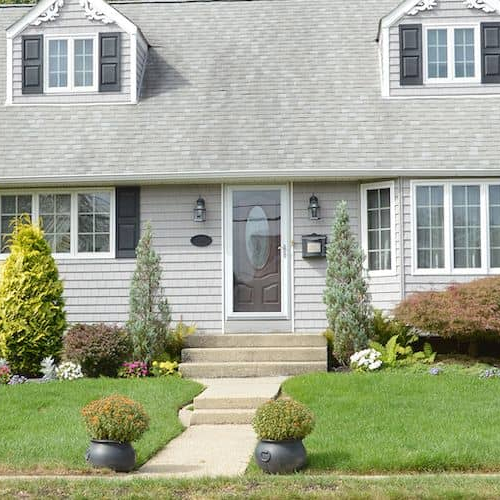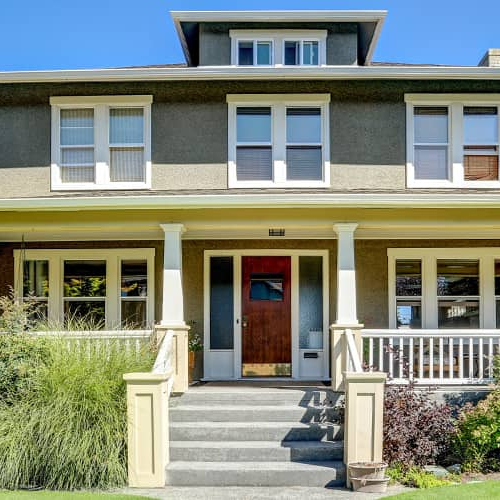How much do I need to make to afford a $600K home?
Dec 30, 2024
•8-minute read
If you’re looking to buy a home right now, you know that in many markets, supply is challenging, and it’s driven home prices higher. The median home price is well under $600,000, but that may not be the case in some higher-cost areas. You may wonder about the income needed to afford a $600K mortgage.
The mortgage you can afford is dependent on a number of factors that we’ll get into throughout this article. As you read on, keep a couple of things in mind: Buying a home at any price is exciting. Also, even if you can’t afford the home of your dreams right now, there’s no reason to think you can’t get there down the line.
Quick answer: What income do I need to afford a $600K home?
The income needed to qualify to buy a $600,000 house depends on the loan option being used and the size of your down payment, so you’ll find the range here is fairly wide: $75,728.14 – $157,050.33.
What factors determine how much you can afford?
Because there are so many variables that determine how much someone can afford, we recommend checking out our Home Affordability Calculator. You can put in your own information and even reset it as much as you want to change inputs and see how it impacts your affordability. When qualifying you for a loan, lenders look at the following:
- Down payment: One of the biggest factors in determining how much you can afford is how much you put down at closing. The bigger your down payment, the lower your loan amount, which brings down your monthly payment. You may hear lenders refer to this as your loan-to-value ratio (LTV). This merely looks at the size of your loan relative to the value of your home. It’s the inverse of your down payment or equity amount. So if you have a 10% down payment, that’s equivalent to a 90% loan-to-value ratio.
- Closing costs: Closing costs are the fees associated with finalizing your loan. Some are paid to lenders while others go to the title agency or the local government. You may pay your real estate agent as well depending on agreements with them and the seller. Total closing costs are generally 3% – 6% of the purchase price.
- Mortgage loan: The type of mortgage that you qualify for is also important because different loan options have different standards in terms of how much debt you’re allowed to take on when you qualify. The type of interest rate also matters because adjustable-rate mortgages (ARMs) are sometimes qualified based on a higher rate than the initial one you receive to ensure you can handle potential payment changes. Finally, the longer the loan term, the more you’ll be able to afford based on a smaller monthly payment.
- Interest rates: You’ll be able to afford a higher home price at lower interest rates than you could if they were higher because it changes the monthly payment. You can get a fixed- or adjustable-rate mortgage. ARMs have slightly lower initial interest rates than fixed-rate mortgages, but you’re subjecting yourself to market conditions when the rate adjusts up or down.
- Credit score: Your credit score impacts the types of mortgage loans you can qualify for. But along with your down payment, it also has a major effect on the interest rate you get. The higher your score, the lower your rate may be.
- Debt-to-income ratio (DTI): DTI reflects the percentage of your pretax monthly income that goes toward the debt payments you have to make. In some cases, lenders will limit the percentage of income that can go toward your mortgage payment and in others, they only look at your total debt payments. Either way, if you can limit your existing debt when qualifying for a mortgage, you’ll be able to afford a bigger payment.
- Homeowners insurance: Your home is likely your biggest asset, so it’s a good idea to protect it anyway, but lenders will require that you at least have enough coverage to replace or rebuild it in the event of major property damage. You can also add coverage to protect personal property and shield you from liability if someone injures themselves at your home.
- Property taxes: These pay for local roads, public schools and other city services like garbage collection. Homeowners insurance and property taxes are often included as part of your mortgage payment in an escrow account, but even if they aren’t, the costs need to be accounted for.
- Homeowners association (HOA) fees: Depending on the neighborhood, you may be subject to HOA fees that pay for things like exterior maintenance, common areas like a pool or tennis courts, and services not handled by the local government (garbage collection, snow removal, etc.).
- Maintenance: Even in the newest or best-cared-for houses, things eventually break. It’s generally recommended to set aside 1% – 3% of the purchase price every year for maintenance, depending on the age and condition of the home.
- Additional assistance: The down payment is often the most daunting hurdle faced by many first-time home buyers. If you qualify based on income, there are often resources for grants as well as traditional, deferred or forgivable loans functioning as down payment assistance (DPA) from lenders or local authorities.
- Location: While this doesn’t impact the size of your budget, you may find that your dollars go further in some places and buy you less in others. You may be able to buy a colonial in one of the cheaper states to buy a house and find the same budget gets you nowhere in Boston.
An income breakdown: How much income do I need to afford a $600K house? (full answer)
Every situation is different, so no one answer as to how much income you need is going to be possible, but what we can do is show how we get to the numbers mentioned in the budget range earlier so that you can apply the math to your own situation.
What percentage of my income should go to my mortgage?
A general rule often used says that you should spend no more than 33% of your monthly income on your mortgage. For example, if you make $9,000 per month, your mortgage payment should be no higher than $3,000.
Mortgage lenders and others have begun to settle around home affordability being based on something called the 28/36 rule, which states that no more than 28% of your gross monthly income can go toward your mortgage. Total debts, including your home loan, should make up no more than 36% of your budget. If you make $10,000 a month, the mortgage payment itself should be no higher than $2,800.
$600K mortgage examples
When it comes to actually qualifying you for the mortgage, lenders will follow different rules based on the mortgage option that works for your situation when determining how much you can afford. We’ve included a 36% affordable DTI ratio for reference, but you’ll notice several others have been added.
If you’re getting a conventional loan, it’s recommended to have a total DTI no higher than 43% although you may be approved with a DTI as high as 50%. FHA loan qualifying DTI can vary based on the situation, but you’ll never be approved with a DTI higher than 57%.
Along with the purchase price, average debts of $1,225 have been assumed. The payment is based on a 30-year term. We’ve also shown the scenario with various interest rates. Here’s how the calculation works:
(Payment ÷ Maximum DTI + Other monthly debts) × 12 = Target annual income
Each table you’re about to see will have the payment based on the down payment in the first column. Following that, you’ll see the income you would need to qualify based on various debt-to-income ratios. Let’s first assume that rates stay around 7%:
| Loan Type and down payment percentage | Payment 7% | 36% DTI; 7% mortgage rate | 43% DTI; 7% mortgage rate | 50% DTI; 7% mortgage rate | 57% DTI; 7% mortgage rate |
|---|---|---|---|---|---|
| Conventional | |||||
| 3% | $3,872.06 |
$143,768.68 | $122,757.50 | $107,629.45 | N/A |
| 5% | $3,792.22 | $141,107.47 | $120,529.51 | $105,713.38 | N/A |
| 20% | $3,193.45 | $121,148.40 | $103,819.59 | $91,342.85 | N/A |
| FHA | |||||
| 3.5% | $3,852.10 | $143,103.38 | $122,200.51 | $107,150.43 | $95,796.87 |
| 10% | $3,592.63 | $134,454.45 | $114,959.54 | $100,923.20 | $90,334.39 |
If we assume rates go up to 8%, here’s what that looks like:
| Loan type and down payment percentage | Payment 8% | 36% DTI; 8% mortgage rate | 43% DTI; 8% mortgage rate | 50% DTI; 8% mortgage rate | 57% DTI; 8% mortgage rate |
|---|---|---|---|---|---|
| Conventional | |||||
| 3% | $4,270.51 | $157,050.33 | $133,877.02 | $117,192.24 | N/A |
| 5% | $4,182.46 | $154,115.27 | $131,419.76 | $115,078.99 | N/A |
| 20% | $3,522.07 | $132,102.33 | $112,990.32 | $99,229.68 | N/A |
| FHA | |||||
| 3.5% | $4,248.50 | $156,316.56 | $133,262.70 | $116,663.93 | $104,142.04 |
| 10% | $3,962.33 | $133,302.62 | $111,801.61 | $96,320.89 | $98,117.45 |
But what happens if rates drop? Let’s look at a 6% interest rate scenario.
| Loan type and down payment percentage | Payment 6% | 36% DTI; 6% mortgage rate | 43% DTI; 6% mortgage rate | 50% DTI; 6% mortgage rate | 57% DTI; 6% mortgage rate |
|---|---|---|---|---|---|
| Conventional | |||||
| 3% | $3,489.38 | $131,012.80 | $112,078.16 | $98,445.22 | N/A |
| 5% | $3,417.44 | $128,614.60 | $110,070.36 | $96,718.51 | N/A |
| 20% | $2,877.84 | $110,628.08 | $95,011.88 | $83,768.22 | N/A |
| FHA | |||||
| 3.5% | $3,471.40 | $130,413.25 | $111,576.21 | $98,013.54 | $87,782.05 |
| 10% | $3,237.57 | $122,619.09 | $105,050.87 | $92,401.75 | $82,859.43 |
Finally, let’s see what happens if rates fall back to 5%:
| Loan type and down payment percentage | Payment 5% | 36% DTI; 5% mortgage rate | 43% DTI; 5% mortgage rate | 50% DTI; 5% mortgage rate | 57% DTI; 5% mortgage rate |
|---|---|---|---|---|---|
| Conventional | |||||
| 3% | $3,124.30 | $118,843.39 | $101,889.82 | $89,683.24 | N/A |
| 5% | $3,059.88 | $116,696.11 | $100,092.09 | $88,137.20 | N/A |
| 20% | $2,576.74 | $100,591.46 | $86,609.13 | $76,541.85 | N/A |
| FHA | |||||
| 3.5% | $3,108.20 | $118,306.57 | $101,440.39 | $89,296.73 | $80,135.73 |
| 10% | $2,898.84 | $111,327.89 | $95,597.77 | $84,272.08 | $75,728.14 |
Of course, there are more costs to homeownership than the mortgage payment itself. Be sure to factor in taxes and insurance as well. This changes the calculation, but it’s going to be different for every area.
Although this estimate will help you with how lenders look at it, it’s important to always be mindful of your own financial comfort level. Do your own budget calculations and determine what works for you. You don’t want to have so much tied up in the house that you don’t have room for discretionary spending or an emergency fund.
How much down payment do I need for a $600K home?
The down payment you’re going to need greatly depends on the type of loan you’re getting. We’ll go over several math examples, but here’s a table for quick reference:
| Loan type and buyer qualification | Down payment percentage | Amount on $600,000 home |
|---|---|---|
| Conventional | ||
| First-time home buyer or low-income | 3% | $18,000 |
| Regular loan for primary residence | 5% | $30,000 |
| Down payment for basic investment property | 15% | $90,000 |
| Avoiding private mortgage insurance | 20% | $120,000 |
| FHA | ||
| 580 credit score or higher | 3.5% | $21,000 |
| Credit score of 500 – 579 | 10% | $60,000 |
| VA loan | Usually 0% | N/A |
| USDA loan | 0% | N/A |
Tips to buy a $600K house
If you’re looking to purchase a $600,000 house, some basic tips will serve you well:
- Work on your credit score. The higher your credit score, the lower your rate. You want to maintain a credit card balance that’s no more than 30% of your credit limit, make your payments on time and try not to take out loans and credit that you don’t need. Also regularly check your credit so you can dispute anything you don’t recognize.
- Pay down your debts. Paying your existing debts down or off prior to applying for a mortgage can leave more room in your budget for a higher monthly payment which could mean the difference between qualifying for the house you want and not.
- Save up for the down payment. Making a higher down payment can mean a lower monthly payment because the balance is smaller. Additionally, if you make a down payment of 20% or more, you can avoid paying for mortgage insurance on conventional loans, which also lowers your monthly payment.
- Get preapproved. If you get preapproved, sellers and their real estate agents can be sure you can afford the offer you’re making, so your offer won’t be discarded as frivolous. Your lender should do a credit check and have you verify assets and income documentation like bank statements, pay stubs and W-2s.
The bottom line: Do the math on income, but give your budget breathing room
Figuring out how much you need to make to afford a house is a simple math problem if you know the price and the debt-to-income ratio that the lender is looking for. At the same time, it’s important not to strictly rely on an equation. Make sure you’ve left yourself room for both fun and an emergency fund.
Feeling ready? Get started with Rocket Mortgage®.
Kevin Graham
Kevin Graham is a Senior Writer for Rocket. He specializes in mortgage qualification, economics and personal finance topics. Kevin has passed the MLO SAFE exam given to mortgage bankers and takes continuing education courses. As someone with cerebral palsy spastic quadriplegia that requires the use of a wheelchair, he also takes on articles around modifying your home for physical challenges and smart home tech. He has a BA in Journalism from Oakland University.
Related resources

8-minute read
How to save for a house: A complete guide
One of the biggest hurdles when buying a home is saving for a down payment, closing costs, and other expenses. Learn how to save for a house more easily.
Read more

10-minute read
How much house can you afford?
Ever asked, “How much house can I afford?” Determine how much you can spend on a mortgage with help from the Rocket Mortgage home affordability calc...
Read more

7-minute read
Can the 30% rule help you budget for housing?
How much should you spend on housing? A general guideline says you should spend 30% of your income on housing. Is the 30% rule for housing true for you?
Read more